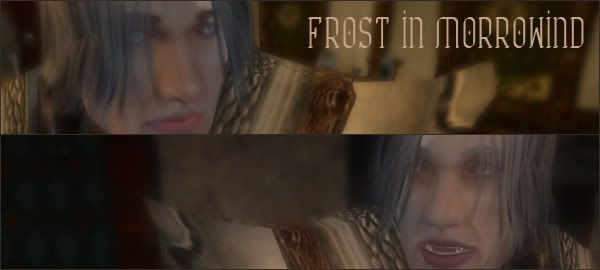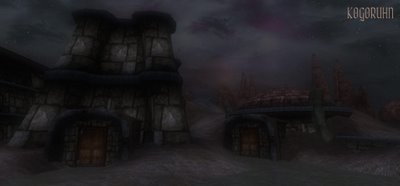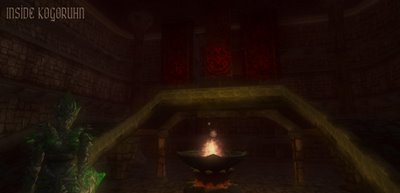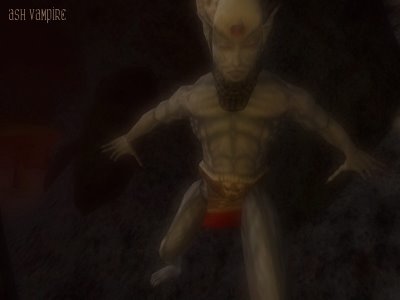Chapter 131: Failing
With an immortal beast stalking us through the lava tunnels under Kogoruhn - a beast that I was certain was an Ash Vampire - Sirilonwe and I raced along as fast as we could, hoping to outrun the thing. Unnervingly, we could not actually tell if it was following us or not: the Ash Vampire had kept eerily silent all through our frantic battle - and if it was chasing us, it was remaining just as quiet about it.
Fortunately, we encountered no other resistance until we found a room with several small shrines (or grave markers - it was difficult to tell), each of them decorated with valuables. Some were quite valuable, indeed. Once we had reduced the tentacle-faced man guarding the chamber to a smear of putrid yellow dust, we had a close - but brief - look around. Along with the Shadow Shield Ashkhan Sul-Matuul wanted (a Dwemer shield enchanted with a minor invisibility cantrip), we found a pair of Daedric gauntlets, in perfect condition. A princely find for my museum.
Considering ourselves fortunate to have found what we came for with that Ash Vampire around, Sirilonwe and I teleported home. The sun was already high in the sky by that time, so we had another day of tedious Mages Guild business to sit through before we could return to the Urshilaku camp.
"Yes... good." Sul-Matuul said. "I knew you would have little trouble with this test."
The Ashkhan took the House Dagoth cup and the Shadow Shield, but indicated that the Corprus weepings (which I had wrapped in a piece of waxed paper) should be thrown in his yurt's hearth-fire.
"You are the first to come this far in a long while." Sul-Matuul continued. "I have no reservations about telling you the secret of the 'Cavern of the Incarnate' now; though you may be disappointed to learn that all I know is this riddle:"
"The eye of the needle lies in the teeth of the wind. The mouth of the cave lies in the skin of the pearl. The dream is the door and the star is the key."
The Ashkhan shrugged, saying:
"This is Wisdom's Test. Seek the wisdom of the tribe, and you shall find the way. Find the moon and star in the Cavern of the Incarnate, and then talk to wise-woman Nibani about it."
That - irritatingly - was all he would say. At least by telling me to "seek the wisdom of the tribe", he had given an obvious hint as to who might help me with the riddle. We went to see Nibani Maesa again.
Strangely, though the wise-woman had refused to speak of the Third Trial directly, she still answered my questions about the riddle; telling me what she thought each line meant. According to her, the star referred to in the riddle was Azura's star; which was only seen in the sky at dawn and dusk. Therefore, the line 'the dream is the door and the star is the key' meant that the door to the Cavern of the Incarnate could only be opened at dawn and dusk. Just like Holamayan, I thought.
As to actually locating the cavern, the first two lines of the riddle were my directions - apparently. Nibani told us of a 'Foyada' (or trench carved out by lava-flows) called the Valley of the Wind, that ran south from the northern coast of Vvardenfell. The valley's entrance, located just past a pair of ruins close to one another (Dwemer and Daedric ruins named Bthuand and Zergonipal respectively), was marked by two great stone spires called 'Airan's Teeth'. These would be the 'teeth of the wind' from the riddle's first line.
'Skin of the pearl', in the second line, referred to another distinctive stone formation at the southern end of the Valley of Wind: another tall spire - with a pale tip. So, 'the mouth of the cave lies in the skin of the pearl' meant that the Cavern of the Incarnate could be found near that distinctive stone spire.
I was still unsure exactly what I was supposed to go to this cavern for - but deciding that at least investigating it would be little trouble, in the grand scheme of things, we set out immediately. Of course if we did find it, and - like Holamayan - we could not get in until dawn, it would mean another long night without feeding; but we knew from uncomfortable experience that we could manage.
We jogged along the grey northern coast, the clear, cold night turning to rain as we went. For maybe an hour we ran through the rain, our feet making sucking noises in the damp ash and sand. The rain began to ease off as we passed Bthuand and then Zergonipal; and then we found it: a deep, smooth Foyada marked by two huge, monolithic stone spires: Airan's Teeth.

As Sirilonwe and I started up the valley, the clouds above scudded aside to reveal the near-full moons. The moonlight fell on the grey, cracked ground, the ghostly light reflecting up and illuminating the whole of the narrow, sheltered valley. For an hour - or perhaps two - we walked along that deep Foyada, the moons hanging in the sky directly over our heads, and bathing us in their light.

Eventually, the path rose into a slope and curved up and around to the west, and then the north. At the end of this hook-shaped path was the door from the riddle: or doors, I should say. Two huge metal doors, fashioned with designs of moons and stars - that predictably refused to swing open, no matter how much force I applied.
My pocketwatch said it was only three hours past midnight. We were faced with a wait, just like outside the Holamayan monastery. Without being able to concentrate on anything that required much thought (since we both knew we would likely be burnt by the sun soon, in our attempts to enter the cavern), we sat and watched the threads of light behind the stars while we waited for the sun to rise.
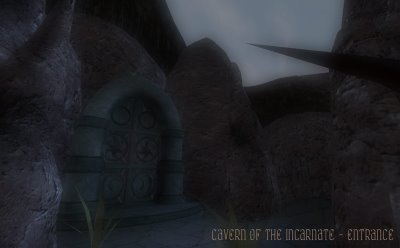
We were already straining against the doors as the dawn's light began to scald our skin - and they swung open easily.
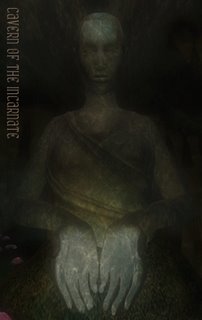 Inside, a short tunnel terminated in a small cavern. A beautiful statue of a woman's upper body sat in the cavern's centre, bathed in an otherworldly light - the source of which I could not find. A fine ring of silver and gold - with the device of a moon and a star fixed to it - was cupped in the statue's outstretched hands.
Inside, a short tunnel terminated in a small cavern. A beautiful statue of a woman's upper body sat in the cavern's centre, bathed in an otherworldly light - the source of which I could not find. A fine ring of silver and gold - with the device of a moon and a star fixed to it - was cupped in the statue's outstretched hands.
"That is the 'moon-and-star' ring!" Sirilonwe exclaimed. "I was reading about it at Holamayan: it is the ring that Indoril Nerevar had made for himself. He had it enchanted so that only he - or the Nerevarine, as the Ashlanders now say - could wear it. It would kill anyone else who tried to put it on."
So that was the 'moon and star' that Sul-Matuul had been hinting at: an enchanted ring that once belonged to Indoril Nerevar. It sounded dangerous. As I reached out to catch the tiny thing up, I decided that I would take it back to the castle - or maybe to my friend Folms, the enchanter, to study its properties. This plan was still forming in my mind when I abruptly realised that the ring was on my finger - without my meaning to put it on!
I yanked the thing off, and stood there for a long moment, frozen; just staring at it.
"You're not dead." Sirilonwe observed. "Well - you are dead: you're a vampire. But... actually, that would probably be why the ring did not kill you: you are already dead." She held up her hands, palms out. "Do not give it to me to test that theory, though!"
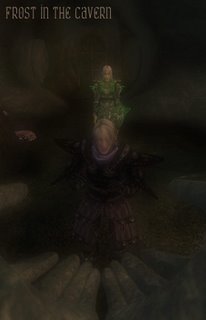 I held the moon-and-star ring up close to my face to examine it closely - and promptly received another nasty shock when I realised that Sirilonwe and I were no longer alone in the cavern. There were soft rustling and muttering noises coming from all sides... and my feeling of alarm did not ease when I realised what was making them.
I held the moon-and-star ring up close to my face to examine it closely - and promptly received another nasty shock when I realised that Sirilonwe and I were no longer alone in the cavern. There were soft rustling and muttering noises coming from all sides... and my feeling of alarm did not ease when I realised what was making them.
We were surrounded by ghosts; all standing quietly in the darkness that pooled around the edge of the cavern. The one closest to me spoke, saying her name was Peakstar. I had heard the name before: Peakstar was the most famous of the 'Failed Incarnates' - people that were rumoured to fit the Nerevarine prophecies, but had failed; usually through the folly of dying.
Every ghost gathered in that small cavern was the same: they were all Failed Incarnates. Peakstar told me of her death at the hands of an Ash Vampire: that had been her failure: she had been "unable to master the arts of war", as she put it. Once she had said her piece, she vanished. I walked among the ghosts, and all did the same thing. They told me of their failure, and then vanished.
They also all said something which troubled me; and I could not understand why, given my attitude to the prophecies. They all told me:
"You are failing."
The following evening, we sat again in wise-woman Nibani's yurt. The Dunmer woman, a dreamy smile on her face, gazed at the moon-and-star ring; held between my thumb and forefinger (I was unwilling to let anyone else touch it, after what had happened when I picked it up).
"What did you see in the Cavern of the Incarnate?" Nibani asked me. "What did you hear?"
I told her about finding the ring, and the ghosts speaking to me - but this did not seem to satisfy her.
"Yes, but what did you see, vampire-Nerevarine? What did you hear?"
Somewhat confused, I insisted that the statue, the ring, and the ghosts were all I had seen. The wise-woman now seemed quite wrong-footed:
"Is that so? It's only that... I saw in my dream that you would..." She trailed off, and gazed at me for an uncomfortably long while.
Eventually she blinked a few times, rapidly, and continued:
"Well, vampire, the Third Trial is complete: you bear the moon-and-star. I congratulate you." Nibani seemed distracted as she spoke. "Now - the Fourth and Fifth Trials are similar to one another, and will both be considerably more difficult than the Third Trial; but as it is said, the Nerevarine will succeed where all others have failed..."
She went on to describe them, but I had of course already heard about the Fourth and Fifth Trials. The Nerevarine was supposed to be able to gain the support and public recognition of all the Ashlander tribes and all the Great Dunmer Houses that resided on Vvardenfell. The Ashlander Tribes had to all name him Nerevarine; and the Great Houses Hlaalu, Redoran and Telvanni had to all agree to name him as 'Hortator', the combined warlord of the Houses.
It was an impossible ask, basically. I had been holding out hope that Nibani had some small, perhaps purely ceremonial matter in mind for the Fourth and Fifth Trials that I could wade through - just to satisfy her and the other cult members enough so we could continue on down the 'path' they had in mind, and eventually come to some way to fight Dagoth Ur. However, when the wise-woman began to speak of persuading every Ashkhan of the Ashlander clans - and every councillor of every Great House Council - to publicly name me Nerevarine and Hortator, I gave up that hope.
There was just no way it could happen. Well, maybe the Ashlander clans: I had already won over the Urshilaku, after all. Not the Great Houses, though. The clans were small and tight-knit, like extended families. The Great Houses represented the government on Vvardenfell; large and structured. A Charm spell here and there would do nothing: not in regulated bodies like those. Any strange or uncharacteristic behaviour caused by such a spell would be recognised.
I was a vampire - they would not do a thing for me; especially not accept me as the Nerevarine. The Great Houses (especially Redoran and Hlaalu) were known to be well under the thumb of the Tribunal Temple; and the Temple persecuted the Nerevarine cult mercilessly.
Added to all this, of course, was the fact that I had never - and still did not - believe that I was the Incarnate.
No, I had to finally accept that Nibani Maesa and I would never see eye-to-eye on the matter of my part in the prophecies - and it was time she was made aware of this. I had been sitting there in silence, lulled by the words of the wise-woman as she spoke of my destiny, as if it was not really my own... and I realised that it was all I did, when it came to the Urshilaku. I had always just sat and listened - and did as they asked. It was too much.
I stood up.
"I am sorry, sera Maesa," I said; "but I do not believe that I am the Nerevarine. All I see are coincidences. Born on a certain day to uncertain parents. That could be many people. Age cannot harm me because I am a vampire. The 'curse-of-flesh before me flies' because a wizard's deadly 'cure' could not kill someone who was already dead. In exactly the same vein, this moon-and-star ring - that is supposed to expose False Incarnates through their death - cannot kill me because I am already dead!"
The wise-woman wore an expression of pure shock. Sirilonwe looked surprised too; but only at my sudden candour, I think. She already knew - and agreed with - my opinions on the prophecies.
"It is all a convenient coincidence - for you -" I continued - "but even if, somehow, I could become the Nerevarine through virtuous and foretold actions - as you seemed to always believe, wise-woman - I would not care to. Why would I? I first came to you - to the Urshilaku - because I was curious about your beliefs. I am sorry to have lied, but that is all that brought me here. I only returned because I was promised the end of Dagoth Ur if I did what you said. The destruction of House Dagoth is all I want. I am not here to be used by the Urshilaku - and all the other tribes - to add to the prestige and power of your clan with knowledge and artefacts!"
This was not something she could deny. I had fetched items of power for Sul-Matuul under the guise of his endless 'tests'; and I had delivered prophecies to Nibani that had been lost to the Ashlanders for scores of generations. They were using me.
I had no need of them. If they knew how Dagoth Ur might be defeated, they would have done something about it - told someone. Told me.
No - I knew who I needed to speak to.
"Another failed one, then." Was all that Nibani said as I left her.
Fortunately, we encountered no other resistance until we found a room with several small shrines (or grave markers - it was difficult to tell), each of them decorated with valuables. Some were quite valuable, indeed. Once we had reduced the tentacle-faced man guarding the chamber to a smear of putrid yellow dust, we had a close - but brief - look around. Along with the Shadow Shield Ashkhan Sul-Matuul wanted (a Dwemer shield enchanted with a minor invisibility cantrip), we found a pair of Daedric gauntlets, in perfect condition. A princely find for my museum.
Considering ourselves fortunate to have found what we came for with that Ash Vampire around, Sirilonwe and I teleported home. The sun was already high in the sky by that time, so we had another day of tedious Mages Guild business to sit through before we could return to the Urshilaku camp.
"Yes... good." Sul-Matuul said. "I knew you would have little trouble with this test."
The Ashkhan took the House Dagoth cup and the Shadow Shield, but indicated that the Corprus weepings (which I had wrapped in a piece of waxed paper) should be thrown in his yurt's hearth-fire.
"You are the first to come this far in a long while." Sul-Matuul continued. "I have no reservations about telling you the secret of the 'Cavern of the Incarnate' now; though you may be disappointed to learn that all I know is this riddle:"
"The eye of the needle lies in the teeth of the wind. The mouth of the cave lies in the skin of the pearl. The dream is the door and the star is the key."
The Ashkhan shrugged, saying:
"This is Wisdom's Test. Seek the wisdom of the tribe, and you shall find the way. Find the moon and star in the Cavern of the Incarnate, and then talk to wise-woman Nibani about it."
That - irritatingly - was all he would say. At least by telling me to "seek the wisdom of the tribe", he had given an obvious hint as to who might help me with the riddle. We went to see Nibani Maesa again.
Strangely, though the wise-woman had refused to speak of the Third Trial directly, she still answered my questions about the riddle; telling me what she thought each line meant. According to her, the star referred to in the riddle was Azura's star; which was only seen in the sky at dawn and dusk. Therefore, the line 'the dream is the door and the star is the key' meant that the door to the Cavern of the Incarnate could only be opened at dawn and dusk. Just like Holamayan, I thought.
As to actually locating the cavern, the first two lines of the riddle were my directions - apparently. Nibani told us of a 'Foyada' (or trench carved out by lava-flows) called the Valley of the Wind, that ran south from the northern coast of Vvardenfell. The valley's entrance, located just past a pair of ruins close to one another (Dwemer and Daedric ruins named Bthuand and Zergonipal respectively), was marked by two great stone spires called 'Airan's Teeth'. These would be the 'teeth of the wind' from the riddle's first line.
'Skin of the pearl', in the second line, referred to another distinctive stone formation at the southern end of the Valley of Wind: another tall spire - with a pale tip. So, 'the mouth of the cave lies in the skin of the pearl' meant that the Cavern of the Incarnate could be found near that distinctive stone spire.
I was still unsure exactly what I was supposed to go to this cavern for - but deciding that at least investigating it would be little trouble, in the grand scheme of things, we set out immediately. Of course if we did find it, and - like Holamayan - we could not get in until dawn, it would mean another long night without feeding; but we knew from uncomfortable experience that we could manage.
We jogged along the grey northern coast, the clear, cold night turning to rain as we went. For maybe an hour we ran through the rain, our feet making sucking noises in the damp ash and sand. The rain began to ease off as we passed Bthuand and then Zergonipal; and then we found it: a deep, smooth Foyada marked by two huge, monolithic stone spires: Airan's Teeth.

As Sirilonwe and I started up the valley, the clouds above scudded aside to reveal the near-full moons. The moonlight fell on the grey, cracked ground, the ghostly light reflecting up and illuminating the whole of the narrow, sheltered valley. For an hour - or perhaps two - we walked along that deep Foyada, the moons hanging in the sky directly over our heads, and bathing us in their light.

Eventually, the path rose into a slope and curved up and around to the west, and then the north. At the end of this hook-shaped path was the door from the riddle: or doors, I should say. Two huge metal doors, fashioned with designs of moons and stars - that predictably refused to swing open, no matter how much force I applied.
My pocketwatch said it was only three hours past midnight. We were faced with a wait, just like outside the Holamayan monastery. Without being able to concentrate on anything that required much thought (since we both knew we would likely be burnt by the sun soon, in our attempts to enter the cavern), we sat and watched the threads of light behind the stars while we waited for the sun to rise.

We were already straining against the doors as the dawn's light began to scald our skin - and they swung open easily.
 Inside, a short tunnel terminated in a small cavern. A beautiful statue of a woman's upper body sat in the cavern's centre, bathed in an otherworldly light - the source of which I could not find. A fine ring of silver and gold - with the device of a moon and a star fixed to it - was cupped in the statue's outstretched hands.
Inside, a short tunnel terminated in a small cavern. A beautiful statue of a woman's upper body sat in the cavern's centre, bathed in an otherworldly light - the source of which I could not find. A fine ring of silver and gold - with the device of a moon and a star fixed to it - was cupped in the statue's outstretched hands."That is the 'moon-and-star' ring!" Sirilonwe exclaimed. "I was reading about it at Holamayan: it is the ring that Indoril Nerevar had made for himself. He had it enchanted so that only he - or the Nerevarine, as the Ashlanders now say - could wear it. It would kill anyone else who tried to put it on."
So that was the 'moon and star' that Sul-Matuul had been hinting at: an enchanted ring that once belonged to Indoril Nerevar. It sounded dangerous. As I reached out to catch the tiny thing up, I decided that I would take it back to the castle - or maybe to my friend Folms, the enchanter, to study its properties. This plan was still forming in my mind when I abruptly realised that the ring was on my finger - without my meaning to put it on!
I yanked the thing off, and stood there for a long moment, frozen; just staring at it.
"You're not dead." Sirilonwe observed. "Well - you are dead: you're a vampire. But... actually, that would probably be why the ring did not kill you: you are already dead." She held up her hands, palms out. "Do not give it to me to test that theory, though!"
 I held the moon-and-star ring up close to my face to examine it closely - and promptly received another nasty shock when I realised that Sirilonwe and I were no longer alone in the cavern. There were soft rustling and muttering noises coming from all sides... and my feeling of alarm did not ease when I realised what was making them.
I held the moon-and-star ring up close to my face to examine it closely - and promptly received another nasty shock when I realised that Sirilonwe and I were no longer alone in the cavern. There were soft rustling and muttering noises coming from all sides... and my feeling of alarm did not ease when I realised what was making them.We were surrounded by ghosts; all standing quietly in the darkness that pooled around the edge of the cavern. The one closest to me spoke, saying her name was Peakstar. I had heard the name before: Peakstar was the most famous of the 'Failed Incarnates' - people that were rumoured to fit the Nerevarine prophecies, but had failed; usually through the folly of dying.
Every ghost gathered in that small cavern was the same: they were all Failed Incarnates. Peakstar told me of her death at the hands of an Ash Vampire: that had been her failure: she had been "unable to master the arts of war", as she put it. Once she had said her piece, she vanished. I walked among the ghosts, and all did the same thing. They told me of their failure, and then vanished.
They also all said something which troubled me; and I could not understand why, given my attitude to the prophecies. They all told me:
"You are failing."
The following evening, we sat again in wise-woman Nibani's yurt. The Dunmer woman, a dreamy smile on her face, gazed at the moon-and-star ring; held between my thumb and forefinger (I was unwilling to let anyone else touch it, after what had happened when I picked it up).
"What did you see in the Cavern of the Incarnate?" Nibani asked me. "What did you hear?"
I told her about finding the ring, and the ghosts speaking to me - but this did not seem to satisfy her.
"Yes, but what did you see, vampire-Nerevarine? What did you hear?"
Somewhat confused, I insisted that the statue, the ring, and the ghosts were all I had seen. The wise-woman now seemed quite wrong-footed:
"Is that so? It's only that... I saw in my dream that you would..." She trailed off, and gazed at me for an uncomfortably long while.
Eventually she blinked a few times, rapidly, and continued:
"Well, vampire, the Third Trial is complete: you bear the moon-and-star. I congratulate you." Nibani seemed distracted as she spoke. "Now - the Fourth and Fifth Trials are similar to one another, and will both be considerably more difficult than the Third Trial; but as it is said, the Nerevarine will succeed where all others have failed..."
She went on to describe them, but I had of course already heard about the Fourth and Fifth Trials. The Nerevarine was supposed to be able to gain the support and public recognition of all the Ashlander tribes and all the Great Dunmer Houses that resided on Vvardenfell. The Ashlander Tribes had to all name him Nerevarine; and the Great Houses Hlaalu, Redoran and Telvanni had to all agree to name him as 'Hortator', the combined warlord of the Houses.
It was an impossible ask, basically. I had been holding out hope that Nibani had some small, perhaps purely ceremonial matter in mind for the Fourth and Fifth Trials that I could wade through - just to satisfy her and the other cult members enough so we could continue on down the 'path' they had in mind, and eventually come to some way to fight Dagoth Ur. However, when the wise-woman began to speak of persuading every Ashkhan of the Ashlander clans - and every councillor of every Great House Council - to publicly name me Nerevarine and Hortator, I gave up that hope.
There was just no way it could happen. Well, maybe the Ashlander clans: I had already won over the Urshilaku, after all. Not the Great Houses, though. The clans were small and tight-knit, like extended families. The Great Houses represented the government on Vvardenfell; large and structured. A Charm spell here and there would do nothing: not in regulated bodies like those. Any strange or uncharacteristic behaviour caused by such a spell would be recognised.
I was a vampire - they would not do a thing for me; especially not accept me as the Nerevarine. The Great Houses (especially Redoran and Hlaalu) were known to be well under the thumb of the Tribunal Temple; and the Temple persecuted the Nerevarine cult mercilessly.
Added to all this, of course, was the fact that I had never - and still did not - believe that I was the Incarnate.
No, I had to finally accept that Nibani Maesa and I would never see eye-to-eye on the matter of my part in the prophecies - and it was time she was made aware of this. I had been sitting there in silence, lulled by the words of the wise-woman as she spoke of my destiny, as if it was not really my own... and I realised that it was all I did, when it came to the Urshilaku. I had always just sat and listened - and did as they asked. It was too much.
I stood up.
"I am sorry, sera Maesa," I said; "but I do not believe that I am the Nerevarine. All I see are coincidences. Born on a certain day to uncertain parents. That could be many people. Age cannot harm me because I am a vampire. The 'curse-of-flesh before me flies' because a wizard's deadly 'cure' could not kill someone who was already dead. In exactly the same vein, this moon-and-star ring - that is supposed to expose False Incarnates through their death - cannot kill me because I am already dead!"
The wise-woman wore an expression of pure shock. Sirilonwe looked surprised too; but only at my sudden candour, I think. She already knew - and agreed with - my opinions on the prophecies.
"It is all a convenient coincidence - for you -" I continued - "but even if, somehow, I could become the Nerevarine through virtuous and foretold actions - as you seemed to always believe, wise-woman - I would not care to. Why would I? I first came to you - to the Urshilaku - because I was curious about your beliefs. I am sorry to have lied, but that is all that brought me here. I only returned because I was promised the end of Dagoth Ur if I did what you said. The destruction of House Dagoth is all I want. I am not here to be used by the Urshilaku - and all the other tribes - to add to the prestige and power of your clan with knowledge and artefacts!"
This was not something she could deny. I had fetched items of power for Sul-Matuul under the guise of his endless 'tests'; and I had delivered prophecies to Nibani that had been lost to the Ashlanders for scores of generations. They were using me.
I had no need of them. If they knew how Dagoth Ur might be defeated, they would have done something about it - told someone. Told me.
No - I knew who I needed to speak to.
"Another failed one, then." Was all that Nibani said as I left her.
